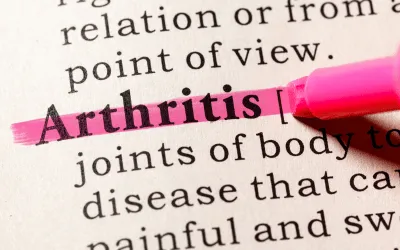About Arthritis
As the nation’s #1 cause of disability, arthritis affects nearly 60 million adults and 300,000 children. Over 100 types of arthritis and related conditions damage the joints and often other organs.
How can we assist you?
Helpful Tools for You

How Genetics, Gout, and Lifestyle Impact Your Heart Health
If you have gout, you might already know how painful and disruptive it can be for your joints. But did you know that a genetic predisposition for gout could also increase your risk for cardiovascular disease (CVD)? A recent study published in RMD Open reveals that individuals with a gout-prone genetic profile face a higher likelihood of developing heart disease. The good news? A healthy lifestyle and good metabolic health can significantly lower this risk—regardless of your genetic background.
Let’s dive into what the study found and how you can take control of your heart and joint health.
What the Research Says
Researchers, led by Ki Won Moon, MD, from Kangwon National University in South Korea, investigated the connection between genetic risk for gout and cardiovascular disease. Using data from two large populations—over 224,000 participants of European descent from the U.K. Biobank and 50,000 East Asian participants from the Korean Genome Study—they examined how genetic predisposition and lifestyle factors influence heart health.
Key findings included:
✅ Genetic gout risk linked to heart disease: People with a higher genetic risk for gout had a greater chance of developing cardiovascular disease.
✅ Lifestyle matters: Favorable lifestyle habits—like avoiding smoking, staying active, and maintaining a healthy weight—significantly reduced cardiovascular risk, even for those with a strong genetic predisposition.
✅ Metabolic health is critical: Good metabolic health (measured by factors like blood pressure, cholesterol, and body weight) was associated with a 62% lower risk of CVD in individuals with high genetic risk for gout.
Why Is This Important?
Gout and hyperuricemia (high levels of uric acid) are closely linked to inflammation, a major driver of joint pain and swelling. While not everyone with high uric acid develops gout, research shows that individuals with gout—especially those with a genetic predisposition—are at a higher risk for cardiovascular disease.
Dr. Moon and his team emphasized that genetics alone do not dictate heart health outcomes:
“The effect of adherence to a healthy lifestyle was greater in individuals with a higher genetic risk.”
In other words, even if you’re genetically prone to gout and heart disease, lifestyle changes like improving your diet, staying active, and avoiding smoking can make a significant difference.
Taking Control: How Lifestyle Can Lower Your Risk
Here are some practical steps to reduce your cardiovascular risk and improve your joint health if you have gout:
Maintain a Healthy Weight: Obesity increases uric acid levels and puts additional strain on your heart. Losing even small amounts of weight can help.
Adopt a Heart-Healthy Diet: Focus on:
Whole, unprocessed foods like fruits, vegetables, and whole grains.
Limiting purine-rich foods (red meat, seafood) that can trigger gout.
Reducing sugar and alcohol intake.
Stay Active: Regular physical activity improves metabolic health, lowers inflammation, and supports heart function. Try walking, swimming, or other low-impact exercises.
Avoid Smoking and Limit Alcohol: These habits worsen both heart and joint health, increasing inflammation and cardiovascular risks.
Monitor Your Health: Regular checkups to measure blood pressure, cholesterol, and uric acid levels can help you and your doctor stay ahead of any problems.
What This Means for Gout Patients
The study highlights that while genetics play a role in your health, they’re not the final word. By focusing on healthy habits, you can reduce your risk of cardiovascular disease and improve your overall well-being—even if you have a higher genetic risk for gout.
Dr. Moon’s team also emphasized the importance of personalized prevention plans and therapeutic interventions for patients with gout. Combining lifestyle improvements with targeted medical care can help manage gout symptoms and protect your heart health in the long term.
If you have gout or a family history of gout, it’s essential to take steps to protect not only your joints but also your heart. A healthy lifestyle, combined with proper treatment, can lower your risk of cardiovascular disease and improve your quality of life—regardless of your genetic predisposition.
GET A REFERRAL TO AN AMERICAN ARTHRITIS FOUNDATION CERTIFIED PHYSICIAN
Effects of Arthritis

Cause of Disability
In the United States, 23% of all adults, or more than 54 million people, have arthritis. It is a leading cause of work disability, with annual costs for medical care and lost earnings of $303.5 billion.

Workforce Effects
Sixty percent of US adults with arthritis are of working age (18 to 64 years). Arthritis can limit the type of work they are able to do or keep them from working at all.

Global Impact
In fact, 8 million working-age adults report that their ability to work is limited because of their arthritis. For example, they may have a hard time climbing stairs or walking from a parking deck to their workplace.
Promoting Interventions That Reduce Arthritis Pain
American Arthritis Foundation recognizes several proven approaches to reduce arthritis symptoms:
Be active. Physical activity—such as walking, bicycling, and swimming—decreases arthritis pain and improves function, mood, and quality of life. Adults with arthritis should move more and sit less throughout the day. Getting at least 150 minutes of moderate-intensity physical activity each week is recommended.
Protect your joints. People can help prevent osteoarthritis by avoiding activities that are more likely to cause joint injuries.
Talk with a doctor. Recommendations from health care providers can motivate people to be physically active and join a self-management education program. Should your arthritis be interfering with your activities of daily living you may be a candidate to receive many new treatments, and learn how to reverse the arthritis condition.
Have a question?
We're Here to Help
By providing my phone number, I agree to receive text messages from the business.


